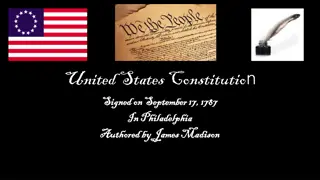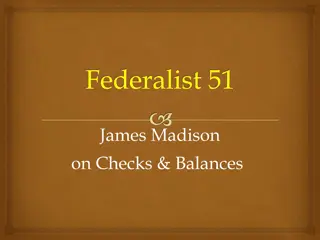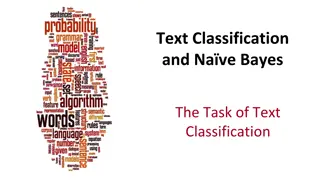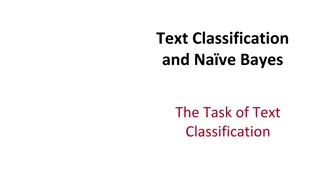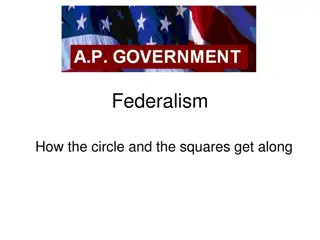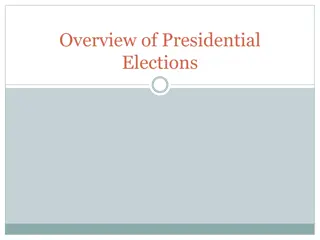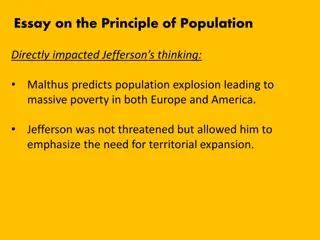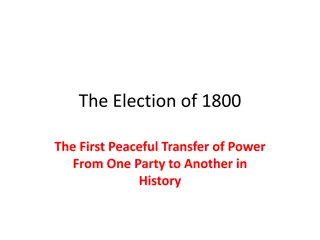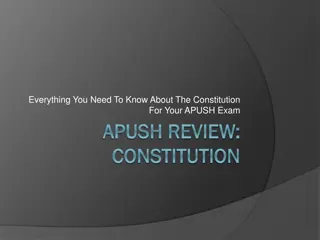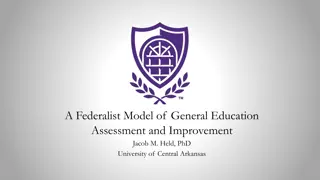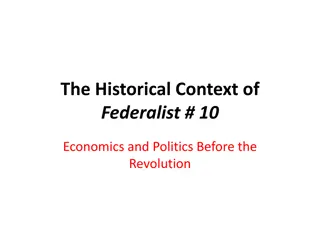Understanding the United States Constitution and Federalism
Delve into the history and significance of the United States Constitution, authored by James Madison in 1787. Explore the debate of ratification, Federalist vs. Anti-Federalist arguments, and the concept of Federalism, with a focus on the balance of powers between the central and state governments.
1 views • 23 slides
Understanding the Importance of Checks and Balances in Federalist Essays
James Madison's Federalist Essays, particularly Federalist 51, emphasize the necessity of a strong government with checks and balances to prevent abuse of power. The essays explore human nature, the need for control over the governed, and the role of government in preventing anarchy and dictatorship
0 views • 12 slides
Understanding Federalist and Anti-Federalist Views on Government Representation
The documents provided showcase the differing viewpoints of Federalist Alexander Hamilton and Anti-Federalist Melancton Smith on government representation in the context of the new Constitution. Hamilton argues for a system that does not prioritize wealth or education, while Smith emphasizes the nee
0 views • 8 slides
Text Classification and Naive Bayes in Action
In this content, Dan Jurafsky discusses various aspects of text classification and the application of Naive Bayes method. The tasks include spam detection, authorship identification, sentiment analysis, and more. Classification methods like hand-coded rules and supervised machine learning are explor
1 views • 82 slides
Understanding Text Classification Using Naive Bayes & Federalist Papers Authorship
Dive into the world of text classification, from spam detection to authorship identification, with a focus on Naive Bayes algorithm. Explore how Mosteller and Wallace used Bayesian methods to determine the authors of the Federalist Papers. Discover the gender and sentiment analysis aspects of text c
0 views • 71 slides
Understanding Federalism in the United States
Federalism in the United States involves the relationship between the federal government and state governments, with terms such as delegated powers, reserved powers, concurrent powers, and the Elastic Clause playing key roles. The aftermath of events like Hurricane Katrina and policies such as No Ch
0 views • 30 slides
Evolution of Political Institutions from Polybius to the Federalist Papers
Explore the evolution of political institutions from ancient thinkers like Aristotle and Polybius to the insights reflected in the Federalist Papers. Delve into the classification of government types, the analysis of political constitutions, and the cyclical nature of states and revolutions as discu
0 views • 26 slides
American History Flash Cards
This collection of American History flash cards covers topics such as why the colonists fought the British, who wrote the Declaration of Independence, and who authored the Federalist Papers. It also encourages students to study, take notes, ask questions, and review with a friend. Engage with these
1 views • 8 slides
Evolution of American Party Systems: A Historical Overview
American party systems have evolved significantly over the centuries, from the Framers' Non-Partisan System to the New Deal Party System. Each era was characterized by different parties, ideologies, and voting trends, reflecting the changing sociopolitical landscape of the United States. From the co
0 views • 9 slides
Impacts of Historical Events on Jefferson's Governance
Malthus's prediction on population growth and poverty influenced Jefferson's emphasis on territorial expansion. His reversal of Federalist policies aimed to restore Republican ideals. The Louisiana Purchase was motivated by securing an agrarian society. Marbury vs. Madison established judicial revie
0 views • 19 slides
The Election of 1800: A Historic Transfer of Power
The Election of 1800 marked the first peaceful transfer of power from one political party to another in American history. Thomas Jefferson and Aaron Burr emerged as key figures, with Jefferson eventually winning the presidency after a contentious process in the House of Representatives. This electio
0 views • 10 slides
Understanding the Constitution for Your APUSH Exam: Key Points & Compromises
The Constitution was born out of the need to address the weaknesses of the Articles of Confederation. Key compromises like the Great Compromise and the 3/5 Compromise shaped its structure. Issues such as a weak central government and economic challenges were tackled through the ratification process.
0 views • 8 slides
Understanding Federalist Papers: Factions and Government
Discover the essence of Federalist Papers through an exploration of factions, democracy, and governance. Learn about the dangers of factions, their causes, and remedies proposed by James Madison. Dive into the significance of factions in shaping governmental decisions and the importance of safeguard
0 views • 31 slides
A Federalist Model of General Education Assessment and Improvement
In this presentation, Dr. Jacob M. Held from the University of Central Arkansas introduces the concept of a Federalist model for assessing and improving general education. The key takeaways emphasize the importance of assessment processes for prompting improvement and fostering meaningful conversati
0 views • 34 slides
Colonial Economics and Politics Before Revolution
The historical context of Federalist #10 delves into the colonial economy and politics preceding the American Revolution. It explores the diverse economic activities in different colonies such as Virginia, the Carolinas, Georgia, and New England. Additionally, the fluid social classes, bicameral leg
0 views • 7 slides
